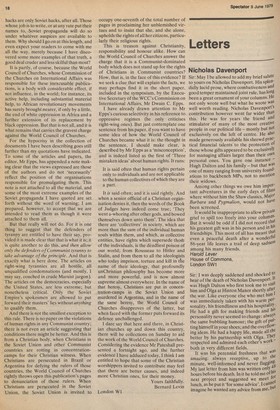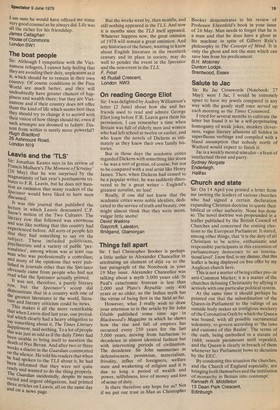Letters
Nicholas Davenport
Sir: May I be allowed to add my brief salute to yours on Nicholas Davenport. His splendidly lucid prose, where combativeness and good temper maintained joint rule, has long been a great ornament of your columns. He not only wrote well but what he wrote was well worth reading. Nicholas Davenport's contribution however went far wider than this. He was for years the friend and stimulator of many of the most creative people in our political life mostly but not exclusively on the left of centre. He also made generously available his shrewd prac tical financial talents to the protection of those whose gifts appeared to be exclusively for managing affairs larger than their own personal ones. You gave one instance Hugh Dalton and his family but that was one of many ranging from university foundations to backbench MPs, not to mention their widows.
Among other things we owe him important adventures in the early days of films where without him the Shaw classics, Major Barbara and Pygmalion, would not have been screened.
It would be inappropriate to allow private grief to spill too freely into your columns. But it would be odd if I did not record that his greatest gift was in his person and in his friendships. This most of all has meant that even a peaceful death after a wonderful 86-year life leaves a trail of deep sadness among his many friends.
Harold Lever House of Commons, London SW1 Sir: I was deeply saddened and shocked to hear of the death of Nicholas Davenport. was Hugh Dalton who first took me to visit him and Olga at Hinton Manor shortly after the war. Like everyone else who met him I was immediately taken with his warm Per" sonality, his friendliness and his hospitality. He had a gift for making friends and lus personality never seemed to change: alwaYs the same bubbling humour; the gift of putting himself in your shoes; and the overfloWing ideas. He had a happy life, made all the better by his partnership with Olga. They respected and admired each other's work both in very different fields. It was his perennial freshness that was amazing: always receptive, up to the minute, well-informed and never flaggIng My last letter from him was written only hours before his death. In it he told me of his next project and suggested we meet f0r. lunch, as he put it 'for some advice'. I canno`t imagine he wanted any advice from me, hu I am sure he would have offered me some very good counsel as he always did. Life was all the richer for his friendship. James Callaghan House of Commons London SW1
The boat people
Sir: Although I sympathise with the Vietnamese refugees, I cannot help feeling that they are avoiding their duty, unpleasant as it is, which should be to remain in their own country. Of course conditions in the Free World are much better, and they will undoubtedly have greater chances of happiness and wealth there; but they are Vietnamese and if their country does not offer them the kind of life which seems best then they should try to change it to accord with their vision of how things should be, even if such attempts are doomed to failure. Dissent from within is surely more powerful? Hugh Bradford 26 Ashmount Road, London N19
Leavis and the `TLS'
Sir: Jonathan Keates says in his review of Francis Mulhern's The Moment of Scrutiny' (26 May) that he was surprised by the magnanimity of last year's posthumous tributes to F.R. Leavis, but he does not mention an omission that many readers of the Spectator would have liked to have seen discussed.
1r was this journal that published the lecture in which Leavis denounced C.P. Snow's notion of the Two Cultures. The literary row that followed was enormous and was like nothing that this country had experienced before. All sorts of people felt that they had something to say on the subject. These included politicians, PsYchiatrists and a variety of public 'personalities', among whom was at least one Mari who was professionally a comedian; and many of the opinions that were published in journals other than the Spectator obviously came from people who had not read what the Spectator actually printed. It was not, therefore, a purely literary row, but the Spectator's scoop did demonstrate that in a country with one of the greatest literatures in the world, literature and literary criticism could be news. This makes it all the more remarkable that when Leavis died last year, one periodical which clearly had a heavy obligation to say something about it The Times Literary Supplement, said nothing. To a lot of people this was just as odd as if the daily Times had been unable to bring itself to mention the death of Nye Bevan. And after two or three weeks a diarist in the Guardian commented on the silence. He told his readers that when he had spoken to the TLS about it, he had been informed that they were not quite ready and wanted to do the thing properly. The. Guardian incidentally, despite its more varied and urgent obligations, had printed three articles on Leavis, all on the same day and on a news page. But the weeks went by, then months, and still nothing appeared in the TLS. And now it is months since the TLS itself appeared. Whatever happens now, the great omission of 1978 will remain a great omission. And any historian of the future, wanting to know about English literature in the twentieth century and its place in society, may do well to ponder the event in the Spectator and the non-event in the TLS.
F. Frost 45 Rudall Crescent, London NW3
On reading George Eliot
Sir: I was delighted by Audrey Williamson's letter (2 June) about how she and her friends used to read and admire George Eliot long before F.R. Leavis gave them his permission, I can remember a time when Britain was full of elderly men and women who had left school at twelve or earlier, and who knew the novels of Dickens as intimately as they knew their own family histories.
But in those days the academic critics regarded Dickens with something like scorn — he was a sort of genius, of course, but not to be compared with a real artist like Henry James. Then, when Dickens had ceased to be a popular writer, he was suddenly discovered to be a great writer — England's greatest novelist, no less! Really, if one did not know that the academic critics were noble idealists, dedicated to the service of truth and beauty, one might almost think that they were mean, vulgar little snobs!
David Watkins Gaycroft, Laleston, Bridgend, Glamorgan
Things fall apart
Sir: I feel Christopher Booker is perhaps a little unfair to Alexander Chancellor in attributing an element of 1104 vu to the last paragraph of the Notebook in your 19 May issue. Alexander Chancellor was talking about a myth 3,000 years old. St Paul's cataclysmic forecast is less than 2,000 and Plato's Republic only 400 years or so older, so the Indian myth has the virtue of being first in the field so far. However, what I really wish to draw your attention to is the article by Sir John Glubb published some time ago in Blackwood's Magazine in which he shows how the rise and fall of empires has occurred every 250 years for the last 3,000 years, moving from barbarism to decadence in almost identical fashion but with intervening periods of civilisation. The decadence Sir John summarises as defensiveness, pessimism, materialism, frivolity, influx of foreigners, welfare state and weakening of religion and it is due to long a period of wealth and power, selfishness, love of money and loss of sense of duty. Is there therefore any hope for us? Not if we put our trust in Man as Christopher Booker demonstrates in his review of Professor Ehrenfeld's book in your issue of 26 May. Man needs to forget that he is a man and that he does have a ghost in his machine in spite of Gilbert Ryle's philosophy in The Concept of Mind. It is only the ghost and not the man which can save him from his predicament.
B.H. Moloney Dunton Lodge, Brentwood, Essex
Salute to Jac
Sir: Re Jac Crosswords (Notebook: 27 May): were I Jac, I would be extremely upset to have my jewels compared in any way with the gaudy stuff once served up each morning as the Times Crossword.
I tried for several months to cultivate the latter but found it to be a self-perpetuating homogamy of weak jokes, monkey cleverness, vague literary allusions all hidden in superfluous verbiage and compiled with a bland assumption that nobody north of Watford would expect to finish it.
Jac is a weekly mental stimulus—a feast of intellectual thrust and parry.
Sydney Norg ate Enderleigh, Halifax
Church and state
Sir: On 14 April you printed a letter from me inviting the leaders of various churches who had signed a certain declaration expanding Christian doctrine to quote their biblical or other authority. None has done so. The novel doctrine was propounded in a leaflet published by the British Council of Churches and concerned the coming elections to the European Parliament. It stated, among other things, that 'it is the duty of all Christians to be active, enthusiastic and responsible participants in this extension of parliamentary democracy to an international level'. I now find, to my dismay, that this leaflet is being displayed on free offer by my Anglican church here. This is not a matter of being either proor anti-Common Market; it is a matter of the churches debasing Christianity by allying it actively with one particular political system. At the same time it should perhaps be pointed out that the subordination of the Queen-in-Parliament to the rulings of an outside body makes an irreligious mockery of the Coronation Oath by which the Queen was bound, with all possible sacramental solemnity, to govern according to 'the laws and customs of this Realm'. The terms of the oath, being embodied in a statute of 1688, remain paramount until repealed, and the Queen is clearly in breach of them whenever her Parliament bows to dictation by the EEC.
By condoning this situation the churches, and the Church of England especially, are bringing both themselves and the institution of monarchy in Britain into contempt. Kenneth R. Middleton 13 Dean Pad( Crescent, Edinburgh











































 Previous page
Previous page